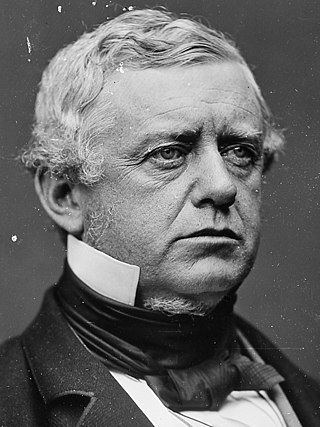Top Qs
Timeline
Chat
Perspective
Samuel Hooper
American politician From Wikipedia, the free encyclopedia
Remove ads
Samuel Hooper (February 3, 1808 – February 14, 1875) was a businessman and member of Congress from Massachusetts.
Remove ads
Early life
Hooper was born in Marblehead, Massachusetts. His father, Robert Hooper, was a shipping merchant and later served as president of the Grand Bank of Marblehead.[1] After a common school education, Hooper traveled aboard his father's shipping vessels as supercargo. He is known to have visited Cuba, Russia, and Spain.[2]
In 1832 Hooper married Ann Sturgis, daughter of William Sturgis, and he became a junior partner in the Boston firm of Bryant and Sturgis, merchants in the California hide trade, trade with the Pacific Northwest, and trade with China.
Remove ads
Business career
In 1841, Hooper partnered with counting house owner and merchant shipper William Appleton to form William Appleton and Company. Soon the firm was engaged in the California hide trade, trade with the Pacific Northwest, and trade with China. The firm acquired additional partners in 1851 when Appleton joined the Massachusetts congressional delegation.[3]
In 1859, Appleton retired from William Appleton and Company. Hooper reorganized the firm with partner Franklin Gordon Dexter, and they adopted the name Samuel Hooper and Company. The firm continued operations after Hooper's death.[3]
Remove ads
Political career
Summarize
Perspective
Hooper was elected to the Massachusetts House of Representatives, serving from 1851 to 1853. He later served in the Massachusetts Senate in 1858.
Upon the resignation of his friend and former partner, Congressman William Appleton from the United States House of Representatives, Hooper was elected to fill the seat, representing Massachusetts's fifth district in the 37th Congress.
He was reelected to the following six congresses representing Massachusetts's fourth district and served as chairman of the Committee on Ways and Means 1869 to 1871, of the Committee on Banking and Currency from 1871 to 1873 and of the Committee on Coinage, Weights and Measures from 1871 to 1875.

From 1861 to 1862, his home in Washington D.C. was the headquarters of General George B. McClellan. In 1866, he was a delegate to the Philadelphia Loyalists' Convention.
He turned down reelection to the 44th Congress and died less than a month before completion of his final term.[4] He was interred in Oak Hill Cemetery in 1875.
Hooper was briefly the father-in-law of Charles Sumner, a powerful senator from Massachusetts. Sumner had married Hooper's widowed daughter-in law, Alice Mason Hooper, but they divorced after a short marriage.
Philanthropy
In 1865 Hooper founded the Hooper School of Mining and Practical Geology at Harvard University with an endowment of $50,000. The gift also established the Sturgis Hooper Professorship in Geology. Named in honor of Hooper's deceased son Sturgis, the professorship received an additional endowment of $30,000 (~$815,133 in 2023) from Hooper's widow in 1881.[5] The city of Hooper, Nebraska, is named after him.[6][7]
Remove ads
Publications
- Currency or money: its nature and uses and the effects of the circulation of bank-notes for currency (1855)
- An Examination of the Theory and the Effect of Laws Regulating the Amount of Specie in Banks (1860)
- A defence of the merchants of Boston against aspersions of the Hon. John Z. Goodrich, ex-collector of customs (1866)
See also
References
External links
Wikiwand - on
Seamless Wikipedia browsing. On steroids.
Remove ads

